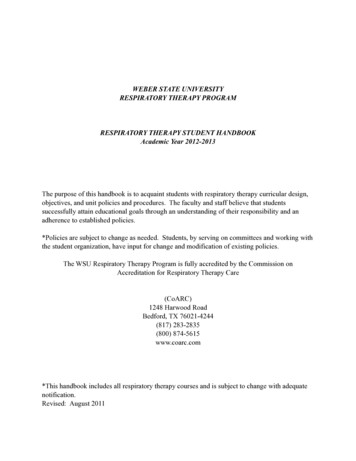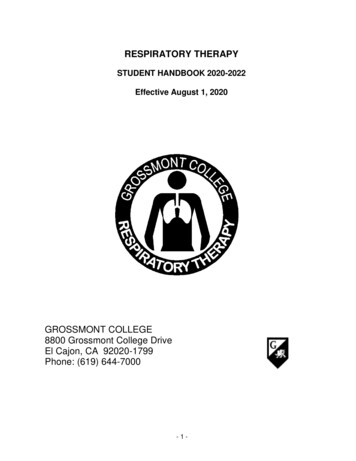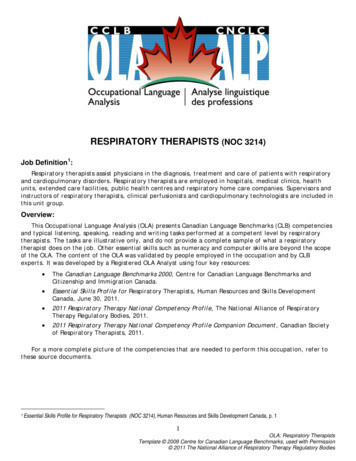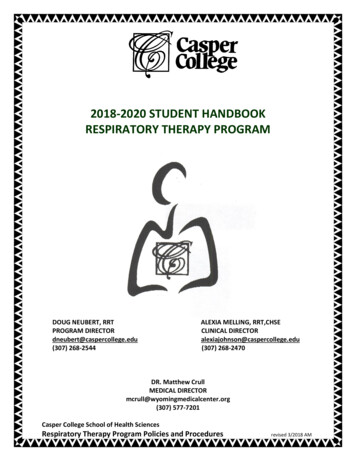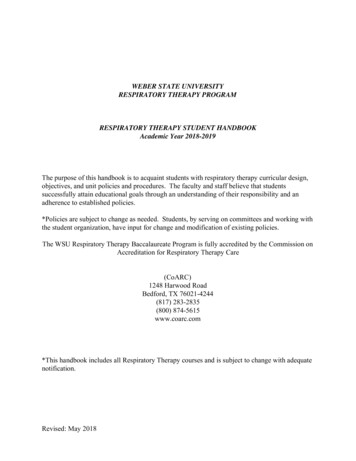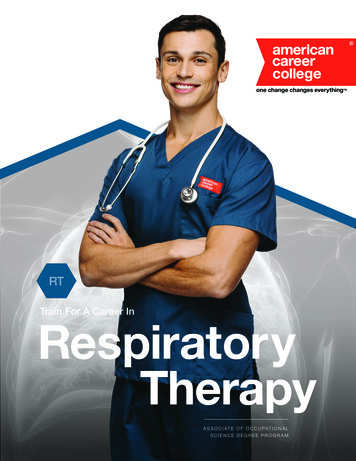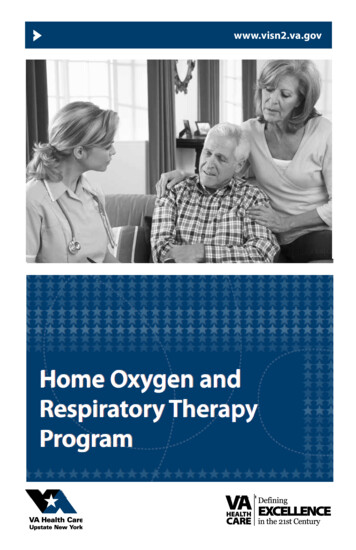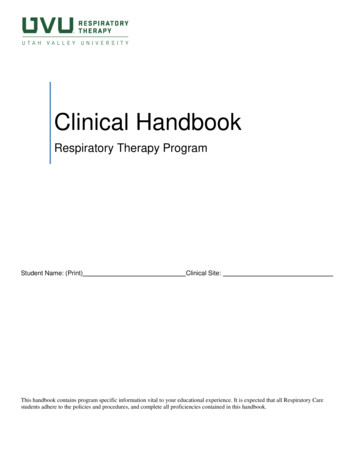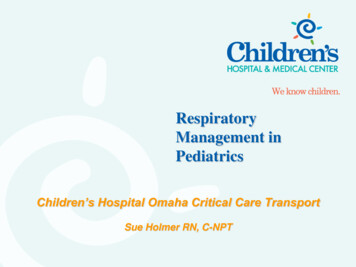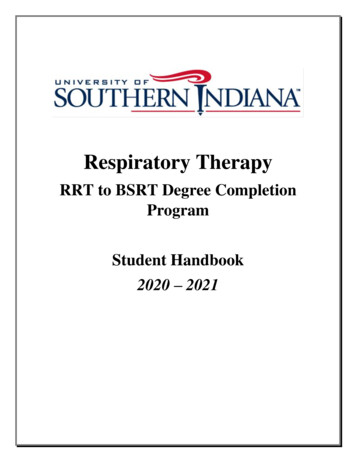
Transcription
Respiratory TherapyRRT to BSRT Degree CompletionProgramStudent Handbook2020 – 2021
Table of ContentsPageINTRODUCTION2AccreditationProgram VisionMission StatementExpected Student Learning OutcomesExpected Student Learning Outcomes Program RubricProgram Core Values StatementProgram GoalsNon-Discrimination and Equal Opportunity StatementTitle IX PolicyDistance Education Disability StatementMinimum System RequirementsEducational RecordsThe Family Educational Rights and Privacy Act (FERPA)Academic Integrity PolicyHealth Insurance Portability and Accountability Act (HIPPA)Social Media PolicyProgram Admission and Application ProcessRegistration ProcessRRT to BSRT Course DescriptionsGrading ScaleExaminations / Review of ExamsRRT to BSRT Course ExpectationsRRT to BSRT Course AssignmentsWriting Skill Requirements (APA)Program Progression and Dismissal PolicyWithdrawal PolicyDismissal PoliciesStudent Rights and Responsibilities / USI Remediation PolicyStudent Academic Resolution and Grievance PolicyReadmission ProcessPolicy Regarding IncompleteStudent Performance Improvement PlanAdvisingGraduation / Graduation DocumentsDiploma and CommencementTuition / Academic CalendarAcknowledgement of Receipt of Student Handbook Signature 13131313-141414151516
Welcome to the program.Letter from the Director of Respiratory TherapyWelcome to the University of Southern Indiana’s on-line degree completion program for theRespiratory Therapy. We are pleased that you have chosen USI to not only further youreducation but to further your professional goals as well! Our faculty and staff are here to assistyou in your educational journey to achieve your BSRT degree.Contained in the student handbook are policies and procedures that will guide and assist youthrough this process. It is your responsibility to be knowledgeable of the policies; however,should you have any questions regarding any of these policies, please ask faculty forclarification. You will find the university policies on the USI websiteAll students are expected to abide by the policies found the College of Respiratory and HealthProfessions Handbook. The handbook is located on the CNHP website listed under “About theCollege.”The RRT to BSRT student handbook may be found on each Blackboard course site. Facultyreserve the right to amend policies and procedures when appropriate. Any revisions will becommunicated to you through USI email.Each student must sign the RRT to BSRT Student Handbook acknowledge agreement that youhave read and understand the policies of the RRT to BSRT and furthermore agrees to complywith these policies as a student of the RRT to BSRT Degree Completion Program.It is my sincere hope that all of you have a successful academic year.Jody Delp, MEd, RRTClinical Assistant ProfessorChair, Respiratory Therapy ProgramAccreditationThe BS Degree Advancement Program in Respiratory Care, CoARC program number 510009,baccalaureate degree at the University of Southern Indiana, Evansville, Indiana holds ProvisionalAccreditation from the Commission for Accreditation for Respiratory Care (www.coarc.com).This status signifies that a program with an Approval of Intent has demonstrated sufficientcompliance with the Standards (through submission of an acceptable Provisional AccreditationSelf Study Report (PSSR) and other documentation required by the CoARC, as well assatisfactory completion of an initial on-site visit.2
Program outcomes data relative to credentialing success, program attrition, job placement,program enrollment, and graduation rates is available on the CoARC website.Program DescriptionThe University of Southern Indiana's RRT to BSRT program offers Respiratory Therapists withan associate degree the opportunity to further their education and ultimately obtain a Bachelor ofScience in Respiratory Therapy (BSRT). Flexibility – All courses offered through distance education giving you control of yourschedule.7-week classes with multiple start datesOpportunities for validation of courses are available through current board certification orportfolio.Mission and PhilosophyVisionIt is the vision and desire of the Respiratory Therapy Program faculty in conjunction with theCollege of Respiratory and Health Professions to produce highly skilled, trained, and competentgraduates through excellence in training and instruction in the profession of RespiratoryTherapy.MissionThe mission of the Respiratory Therapy Program is to provide sound instruction and resourcesthat will enable students to develop the knowledge, skills, attitude, and critical thinking whichare necessary to become successful and competent respiratory therapists. The RespiratoryTherapy Program fosters and promotes health and wellness through the advancement ofeducation, teaching excellence, practice, research, community engagement and a commitment tolifelong learning.Expected Student Learning Outcomes (ESLO)1. Demonstrate professional behaviors consistent with the respiratory care code of ethics,ethical obligations, and professional conduct.2. Demonstrate appropriate critical thinking and problem-solving skills, time managementskills, interpersonal communication skills, and technical skills necessary to providecompetent respiratory care in multidisciplinary care settings.3
3. Evaluate evidence-based best practices through research and the critique andinterpretation of professional scientific literature.4. Assess current issues and trends in health care, including public policy, access, qualityimprovement, and legal and ethical topics.5. Develop respiratory education through the diagnosis, management, and treatment ofpatients affected by cardiopulmonary disorders.6. Apply and evaluate information in relation to the advanced medical treatment of thecritically ill adult patient relevant to his/her role as an advanced level respiratorytherapist.7. Illustrate understanding of the importance of pulmonary rehabilitation and its impact oncardiopulmonary disorders.8. Examine effective leadership techniques and practices used in the healthcare setting.9. Apply knowledge learned to specific areas of respiratory therapy through independentresearch.Expected Student Learning Outcomes Program RubricESLO1. Demonstrate professionalbehaviors consistent withthe respiratory care code ofethics, ethical obligations,and professional conduct.ActionProgram will provide curriculumcontent which promotes anethical framework centered onprofessional conduct. Curriculummay include selective journaland/or textbook readingassignments, power-pointpresentation, voice thread,discussion board, and Panoptolectures.2. Demonstrate appropriatecritical thinking andproblem-solving skills, timemanagement skills,interpersonalcommunication skills, andtechnical skills necessary toprovide competentrespiratory care inmultidisciplinary caresettings.Program will provide curriculumcontent which promotes bothoral and written interpersonalcommunication and criticalthinking skills necessary toprovide care in a multidisciplinarysetting. Curriculum may includeselective journal and/or textbookreading assignments, powerpoint presentation, voice thread,discussion board, and Panoptolectures. 4EvaluationSuccessful completion of anapproved ethics course related tohealthcare. (IPH 356 or equivalent)Professional behaviors includingacademic honesty dependability,responsibility, teamwork, andcommitment will be reviewed byfaculty for all REST courses.CourseREST 451REST 452REST 453REST 454REST 455REST 456REST 460REST 499TimelinePerSemesterSuccessful completion of aninterprofessional health andcommunications course. (IPH 401and UNIV approved communicationcourse)Critical thinking and problem solvingskills including application, analysis,and decision making will bereviewed by faculty for all RESTcourses.REST 451REST 452REST 453REST 454REST 455REST 456REST 460REST 499PerSemester
3. Evaluate evidence-basedbest practices throughresearch and the critiqueand interpretation ofprofessional scientificliterature.Program will provide curriculumcontent which promotes use ofevidenced based research andpractice in healthcare delivery.Professional articles, websites,and organizations will beexamined. Curriculum mayinclude selective journal and/ortextbook reading assignments,power-point presentation, voicethread, discussion board, andPanopto lectures. 4. Assess current issues andtrends in health care,including public policy,access, qualityimprovement, and legal andethical topics.Program will provide curriculumcontent which explores theimpact of the respiratorytherapist in assessment ofcurrent healthcare policy, as wellas review of political and societalinfluences.Curriculum may include selectivejournal and/or textbook readingassignments, power-pointpresentation, voice thread,discussion board, and Panoptolectures. 5. Develop respiratoryeducation through thediagnosis, management,and treatment of patientsaffected bycardiopulmonary disorders.Program will provide curriculumwhich emphasizes developmentof respiratory therapy diseaseeducation, management, andtreatment. Curriculum mayinclude selective journal and/ortextbook reading assignments,power-point presentation, voicethread, discussion board, andPanopto lectures.Program will provide curricularcontent which focuses on thetreatment of the critically ill adultpatient. Curriculum may includeselective journal and/or textbookreading assignments, powerpoint presentation, voice thread,discussion board, and Panoptolectures. Program will provide curricularcontent illustrating theimportance of pulmonaryrehabilitation for thecardiopulmonary patient throughthe review of patient education,pulmonary rehabilitationmethods, and expected patientoutcomes. Curriculum mayinclude selective journal and/ortextbook reading assignments,power-point presentation, voicethread, discussion board, andPanopto lectures.Program will provide curricularcontent examining practices ofeffective leadership styles andmanagement techniques in the 6. Apply and evaluateinformation in relation tothe advanced medicaltreatment of the critically illadult patient relevant tohis/her role as an advancedlevel respiratory therapist.7. Illustrate understandingof the importance ofpulmonary rehabilitationand its impact oncardiopulmonary disorders.8. Examine effectiveleadership techniques andpractices used in thehealthcare setting. 5Successful completion of anintroductory course (REST 452).Further optional research coursesmay be taken.Literature review in REST 451 andresearchassignments/papers/projects arerequired in all REST courses.REST 451REST 452REST 453REST 454REST 455REST 456REST 460REST 499PerSemesterSuccessful completion of arespiratory therapy professionalissues course (REST 456).Leadership, policy, and qualityimprovement are discussed in otherrespiratory therapy courses.REST 451REST 453REST 454REST 455REST 456PerSemesterSuccessful completion of arespiratory therapy diseasemanagement course (REST 453).Cardiopulmonary education andrehabilitation material is alsodeveloped in REST 455.REST 453REST 455PerSemesterSuccessful completion of a criticalcare course (REST 454).Discussion and/or development oftreatment options of the critically illpatient with pulmonary disease isrequired in REST 453.REST 453REST 454PerSemesterSuccessful completion of apulmonary rehabilitation course(REST 455).Pulmonary rehabilitation isdiscussed as a valuable treatmentoption as discussed in diseasemanagement course, REST 453.REST 453REST 455PerSemesterSuccessful completion of amanagement and leadership inrespiratory course (REST 451).REST 451REST 453REST 456PerSemester
9. Apply knowledge learnedto specific areas ofrespiratory therapy throughindependent research.healthcare setting. Curriculummay include selective journaland/or textbook readingassignments, power-pointpresentation, voice thread,discussion board, and Panoptolectures. Effective leadership practices arediscussed within overview of diseasemanagement (REST 453) and issuesrelated to respiratory therapyincluding professional andregulatory agencies (REST 456).Program will provide curricularcontent which allows studentsthe opportunity to independentlyresearch respiratory therapytopics under the direction offaculty. Curriculum may includeselective journal and/or textbookreading assignments, powerpoint presentation, voice thread,discussion board, and Panoptolectures. Successful completion of anindependent study of respiratorytherapy course (REST 460).Independent research is alsorequired for projects and discussionsin other respiratory courses. REST 451REST 452REST 453REST 455REST 456REST 460REST 499PerSemesterProgram Core ValuesCaring, Excellence, Integrity, Leadership, Scholarship, and Social Justice.Program Goals1. To provide graduates of entry into respiratory care professional practice degree programswith additional knowledge, skills, and attributes in leadership, management, education,research, or advanced clinical practice both to meet their current professional goals and toprepare them for practice as advanced degree respiratory therapists.2. To provide community leadership through engagement, service learning, andorganizational involvement.3. To provide an inclusive learning, caring community that supports students’ success andgraduation.4. To serve as a leader in respiratory education, evidence based practice, research, andhealth care.5. To promote and advance personal development and inter-professional collaboration ofrespiratory faculty, staff, graduates, and health professionals.Guidelines and StandardsNon-Discrimination and Equal Opportunity StatementThe University of Southern Indiana is an equal employment opportunity/affirmative actionemployer. It is the policy of the University of Southern Indiana to be in full compliance with all6
federal and state non-discrimination and equal opportunity laws, orders, and regulations relatingto race, sex, religion, disability, age, national origin, sexual orientation, or veteran status.Questions or concerns should be directed to the Affirmative Action Officer, USI HumanResources Department, 8600 University Boulevard, Evansville, IN 47712.Title IX PolicyUSI does not tolerate acts of sexual misconduct, including sexual harassment and all forms ofsexual violence. If you have experienced sexual misconduct, or know someone who has, theUniversity can help. It is important to know that federal regulations and University policy requirefaculty to promptly report incidences of potential sexual misconduct known to them to the TitleIX Coordinator to ensure that appropriate measures are taken and resources are made available.The University will work with you to protect your privacy by sharing information with onlythose who need to know to ensure we can respond and assist. If you are seeking help and wouldlike to speak to someone confidentially, you can make an appointment with a counselor in theUniversity Counseling Center. Find more information about sexual violence, including campusand community resources at www.usi.edu/stopsexualassault.Distance Education Disability StatementIf you have a disability for which you may require academic accommodations for this class,please contact Disability Resources at 812-464-1961 or email Ronda Stone at rfstone@usi.edu assoon as possible. Students who are approved for accommodations by Disability Resourcesshould request their accommodation letter be sent to their online instructors. Due to the nature ofonline courses some accommodations approved for on campus courses may not apply. Pleasediscuss this with Disability Resources to clarify as needed. Students who receive anaccommodation letter from Disability Resources are encouraged to discuss the provisions of thoseaccommodations with their professors before or during the first week of the semesterMinimum System Requirements A Reliable Computer: a dedicated computer with an updated operating system, such asWindows 7or later, or Mac OSX.High-Speed Internet Connection: (e.g. DSL or Cable). All USI online students are required tohave a stable high-speed Internet connection. A wired Internet connection is recommended foronline meeting, exams, and assignment submission.Microsoft Office & Adobe Acrobat Reader installed.Supported Web Browser: Firefox, Google Chrome, or Safari.Headset & WebcamEducational RecordsUniversity of Southern Indiana complies with federal regulations pertaining to studenteducational records, as set forth in the Family Educational Rights and Privacy Act of 1974.Under the Act, students have certain rights regarding official student records. These rights aresummarized as follows:7
1. To be provided a list of the types of educational records, as defined in the Act, which ismaintained by the school and which is directly related to the student.2. To inspect and review the contents of those records.3. To obtain copies of those records upon payment of expenses.4. To receive explanations of those records upon request.5. To obtain an opportunity for a hearing to challenge the contents of those records.6. To receive confidential treatment, by the school, of educational records; neither recordsnor personally identified information contained within, will be released without studentor parent permission to anyone other than those parties specifically authorized by the Act.7. Student records are archived electronically and retained permanently.The Family Educational Rights and Privacy Act (FERPA)The Family Educational Rights and Privacy Act (FERPA) affords students certain rights withrespect to their education records. FERPA guidelines may be found at the USI ic Integrity PolicySee the CNHP handbook for a complete policy academic integrity: Web Link:https://www.usi.edu/health/handbook/Health Insurance Portability and Accountability Act (HIPPA)See the CNHP handbook for a complete policy on HIPPA: Web Link:https://www.usi.edu/health/handbook/Examples of HIPPA violations would include posting photos, videos, describing experiencesinvolving patients or using patient names that could possibly link a patient for identification tosocial media such as “face book.”Violation of the HIPAA law is a serious offense and punishable by fines and/orimprisonment. Students found in violation of the HIPAA law will be immediately dismissedfrom the program.Social Media PolicySee the CNHP handbook for a complete policy on social media: Web Link:https://www.usi.edu/health/handbook/8
Program Admission Completion of a CoARC accredited associate degree program in respiratory therapy. A cumulative grade point average of 2.5 on a 4.0 scale. An active RRT credential issued by the National Board for Respiratory Care.Application Process Applicants must apply and be accepted to the University of Southern Indiana. This includesthe payment of an application fee as well as the submission of college/universitytranscripts to USI Undergraduate Admissions, 8600 University Blvd, Evansville, IN 47712. RRT-BSRT application is embedded in the USI application. Be sure to choose this option. Applicants must submit official transcripts from all undergraduate institutions attended.Registration Process All transfer students must take the new student on-line orientationThe Advisor will develop and send the student a detailed advising plan.The advisor will remove the advising hold on the student’s account.The student will provide his or her advisor a proposed start date.Transfer students will be sent a “block credit” form that must be signed and returned to his orher advisor.CurriculumRRT to BSRT Curriculum Students may transfer in credits earned at an accredited community college or 4-yearuniversity.No limitation on number of credits that may transfer into USI.For students who earned their AS degree somewhere other than USI, a block of up to 50credit hours can be awarded with confirmation of the RRT credential and licensure, whereapplicable.Total program requirements: 120 credits39 credit hours of the 120 credit hours earned must consist of courses at the 300/400 level tobe eligible for the Bachelor of Science degree.A minimum of 30 credit hours toward the completion of the baccalaureate degree must beearned from USI.Students within the degree completion program must meet the University’s corecurriculum in addition to the respiratory therapy curriculum in order to fulfill graduationrequirements.Students must make a “C” or better in each REST course to progress or complete the RRT toBSRT program. Students will not receive course credit for grades of “D” or below and mustrepeat the REST course to progress.9
Credit for Prior Learning through Validation.The University of Southern Indiana provides opportunities for RT students progressing toward aBSRT degree to receive credit for previous professional experience. Students may receive creditfor professional certification, previous clinical experiences, and/or expertise.Validation with a nationally recognized certification. Students who are currently certified in an area which correlates to the course content mayreceive credit for the entire course.Students should submit a copy of their current certification to the course advisor ordepartment chair for approval.Students must request third party verification of certification submitted directly toadministrative assistant for the RRT to BSRT program.Course DescriptionsRRT to BSRT Course DescriptionsThe shared required non-respiratory therapy courses will consist of 19 credit hoursselected from the following: HP 302 – Biostatistics (3 Credits)MATH 107 – Fundamentals of Math (4 Credits)IPH 401 – Interprofessional Perspectives on Global Health (3 credits)HP 356 – Ethics and Health Care in a Pluralistic Society (3 credits)WLC 155 – Cultural Awareness (3 Credits)NUTR 376 – Principals and Applications in Nutrition (3 Credits)The shared respiratory therapy courses will consist of 22 - 30 credit hours from thefollowing: REST 451 - Management and Leadership for Respiratory Therapy (3 credits)REST 452 – Introduction to Research in Respiratory Therapy (3 credits)REST 453 – Respiratory Therapy Disease Management Concepts (3 credits)REST 454 - Advanced Critical Care Management (3 credits)REST 455 – Pulmonary Rehabilitation and Geriatrics (3 credits)REST 456 - Professional Issues in Respiratory Therapy (3 credits)REST 460 – Independent Study of Respiratory Therapy (1 - 6 credits)REST 499 – Special Topics in Respiratory Therapy (3 - 6 credits)10
Grading ScaleLetter grades for professional respiratory therapy courses (prefix REST) are based on the followingscale, unless otherwise specified in course syllabus:GradePercentA90% - 100%B 87% - 89%B83% - 86%C 80% - 82%C75% - 79%D72% - 74%F71% and belowGrades received throughout the semester, including grades onexaminations, quizzes, projects, papers, etc. will be rounded up tothe next whole number if the numeric grade contains a fraction of.5 or greater. For example, an examination grade of 87.8% wouldbe rounded up to an 88%. An examination grade of 87.4% wouldnot be rounded up and would be recorded as an 87%. The finalcourse percentage grade for the semester will not be rounded up.For example, a final course percentage grade of 87.8% would berecorded as an 87%.All assignments and projects must be completed and submitted onor before the dates due. All make-up assignments must besubmitted by the dates specified by the course instructor. Failureto do so will result in a zero for the assignment.Depending on the circumstance of the missed assignment or exam, it will be at the instructor’sdiscretion to issue a grade of “incomplete” until the assignment can be submitted. AssignmentsNOT submitted within two weeks of the incomplete will result in a zero grade for the missedassignment or exam.An Incomplete grade at the close of an academic semester must be approved by the Director ofthe Respiratory Therapy Program. An Incomplete will be used only when extenuatingcircumstances have resulted in the student being unable to complete course requirements by theend of the semester. In rare instances in which this occurs, the following policies are in effect:1. A grade of Incomplete will not be used to allow for remedial work; student work must beat the passing level.2. All University of Southern Indiana policies regarding incomplete grades are applicable torespiratory therapy courses. Please refer to the University Of Southern Indiana Bulletin.Examinations / Review of ExamsAll examinations will be administered only on the date and time announced.Make-up exams will be given under the following circumstances:1.2.3.4.Death in the student's immediate family.Hospitalization of the student.Written excuse from student's personal physician.Other extenuating circumstances will be reviewed by the Program Chair and may beapproved.11
Missed quizzes cannot be rescheduled. Students missing a quiz will receive a grade of 0 forthe missed quiz.RRT to BSRT Course ExpectationsThe RRT to BSRT program classes are all online. Students are expected to participate in onlinediscussions and submit assignments as designated in the course calendar. Planned absences fornon-university related activities must be pre-approved by course instructor at least one monthbefore the absence. Any assignments missed should be completed before the absence. If thestudent is absent for an exam, the exam should be taken within 24 hours of return. The student isresponsible for contacting the course instructor to discuss the absence. If the absence isapproved, the student must communicate with each course faculty to plan make-up of missedassignments, clinical, and/or exams. In case of an emergency, contact the course faculty as soonas possible. All course assignments must be completed. If a student does not communicate withfaculty and make arrangements for completion of assignments, faculty may deduct from theassignment or exam grade or give a grade of zero for the assignment or exam.RRT to BSRT Course AssignmentsWritten assignments are essential to meeting course objectives and must be submitted to facultyby the announced date. If problems are noted with written assignments, the student will becounseled and issued a letter of warning. A copy of the letter will be placed in the student'sacademic file in the College Office. Failure to submit written assignments on time may result inthe student being given a "0" for the assignment.Writing Skill Requirements (APA)The Respiratory Therapy Programs will abide by the 6th Edition of the APA Manual for writtenassignments. Faculty will provide guidelines regarding minimal expectations for adherence toAPA style. Additional guidance for writing in APA style may be found at the library web site.RRT to BSRT Program Progression and Dismissal Policy1. Students must achieve a minimum grade of "C" in all respiratory courses to satisfy therequirements for graduation and progress.2. Students must retake a respiratory course in which a grade of "D" or less grade isearned. If the repeated grade is acceptable ("C" or above) only the higher grade will bereflected in the student's GPA. If a grade of "D" is earned when repeating the course orin any subsequent respiratory course, the student must submit a performanceimprovement plan to the program Chair for program progression. If a grade of “D” and“F” is earned in any two or more REST courses, the student will be dismissed from theprogram. Likewise, if a grade of “F” is earned in any two REST courses, the studentwill be dismissed from the program.12
Withdrawal PolicyThe option of withdrawing from a respiratory course and receiving a grade of "W" is possiblewithin the withdrawal period listed on the academic calendar each semester. For courses lastingless than the full semester, the option of withdrawing with a "W" is possible within the first 60%of the course. Refer to the course schedule and/or calendar for specific dates.See University guidelines for the procedure that must be followed regarding withdrawal.Students who do not follow the required University procedure to officially withdraw from acourse will receive an "F" grade.Dismissal Policies1. Falsification of records and reports and cheating on an examination, quiz, or any otherassignment will be a basis for dismissal from the program.2. Plagiarism, as defined in the University Bulletin, is the intentional reproduction of anotherperson’s ideas, words, or statements without acknowledgment. Students must give creditwhen using the works of others and are expected to properly reference the use of: 1) directquotes; 2) another person’s ideas or opinions; or 3) any borrowed statistics, facts, or othermaterials. Failure to properly give credit to others’ work is a form of academic dishonesty(University Bulletin, Student Rights and Responsibilities).3. Academic honesty is an expected behavior of all students. Academic dishonesty mayinclude, but is not limited to, cheating, plagiarism, fabrication, and knowingly assistingothers in an act of academic dishonesty. Students who engage in academic dishonesty inany form, even as a first offense, place themselves in jeopardy of receiving a failing gradefor the assignment or course, as well as dismissal from the respiratory program andUniversity. Policies and procedures governing academic dishonesty can be found in theStudent Rights and Responsibilities section of the University Bulletin.4. Violation of client and/or agency confidential information may result in dismissal from theprogram.5. The Faculty reserves the right to dismiss any student whose personal integrity, health orbehavior demonstrate unfitness to continue preparation for the profession of respiratoryand/or violate the Code of Ethics.13
Student Rights and Responsibilities / USI Remediation PolicyThe Health Services Program adheres to the USI Student Handbook and UniversityBulletin’s Student Rights and Responsibili
related to respiratory therapy including professional and regulatory agencies (REST 456). 9. Apply knowledge learned to specific areas of respiratory therapy through independent research. Program will provide curricular content which allows students the opportunity to independently research respiratory therapy topics under the direction of faculty.
